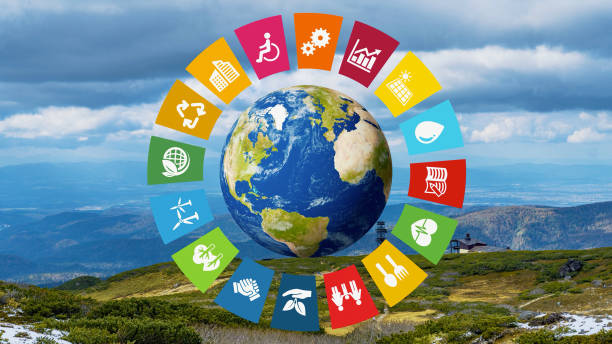
The global ecological crisis is a manifestation of unsustainable development. International, regional and domestic legal frameworks have been trying to respond to unsustainable development for decades – with limited success.
In 2024, we know that scientifically speaking, there are nine ‘planetary boundaries’ within which humanity can continue to develop and thrive for generations to come. The integrity of the system however depends on the cooperation, accountability and commitment of multiple actors involved in the global law and governance architectures of our time.
Since the inception of the concept of ‘sustainable development’ in the 1980s much happened in terms of law and policy development and the roll-out of scholarship, jurisprudence, and normative instruments aiming for the critical ‘balance’ between environmental, social and economic ‘interests’ of present and future generations. The legal foundations of sustainable development are spread across jurisdictions, legal fields and disciplines, firmly embedded in different expressions of justice. For this reason, it is impossible to define ‘sustainable development law’ and is it preferred to refer to the substantive focus of this module as the ‘law on / for sustainable development’.
Sustainable development is often coupled with the objectives of environmental law as rooted in international and domestic public law. However, the tentacles of sustainable development reach into a vast range of procedural, private and mercantile law principles and rules. Some of the key sustainable development questions of our time concern urbanisation, cross-border conflict, human and ecosystem health, the decentralisation of governing power, the rights of future generations and the protection of marginalised groups and threatened species.
The pursuit of sustainable development itself is one of the biggest challenges of our time and humanity’s inability to get this right is best reflected in the devastating impacts of climate change on people and places. This module aims to look at the challenge of sustainable development through the lens of the 17 United Nations Sustainable Development Goals (SDGs) with specific reference to the areas of overlap with African regional and South African law imperatives.
The module further highlights the intersection between climate change and the 17 SDGs against the background of evolving legal concepts such as ‘environmental constitutionalism’, ‘earth systems law’ and ‘climate justice’. The module will be of interest to any LLM student interested in understanding how different fields and sources of law merge in the quest to find long-term solutions for the causes and impacts of unsustainable development, the global ecological crisis and the related (persistent) injustices experienced in countries in the Global North and South.
Welcome and enjoy!
In 2024, we know that scientifically speaking, there are nine ‘planetary boundaries’ within which humanity can continue to develop and thrive for generations to come. The integrity of the system however depends on the cooperation, accountability and commitment of multiple actors involved in the global law and governance architectures of our time.
Since the inception of the concept of ‘sustainable development’ in the 1980s much happened in terms of law and policy development and the roll-out of scholarship, jurisprudence, and normative instruments aiming for the critical ‘balance’ between environmental, social and economic ‘interests’ of present and future generations. The legal foundations of sustainable development are spread across jurisdictions, legal fields and disciplines, firmly embedded in different expressions of justice. For this reason, it is impossible to define ‘sustainable development law’ and is it preferred to refer to the substantive focus of this module as the ‘law on / for sustainable development’.
Sustainable development is often coupled with the objectives of environmental law as rooted in international and domestic public law. However, the tentacles of sustainable development reach into a vast range of procedural, private and mercantile law principles and rules. Some of the key sustainable development questions of our time concern urbanisation, cross-border conflict, human and ecosystem health, the decentralisation of governing power, the rights of future generations and the protection of marginalised groups and threatened species.
The pursuit of sustainable development itself is one of the biggest challenges of our time and humanity’s inability to get this right is best reflected in the devastating impacts of climate change on people and places. This module aims to look at the challenge of sustainable development through the lens of the 17 United Nations Sustainable Development Goals (SDGs) with specific reference to the areas of overlap with African regional and South African law imperatives.
The module further highlights the intersection between climate change and the 17 SDGs against the background of evolving legal concepts such as ‘environmental constitutionalism’, ‘earth systems law’ and ‘climate justice’. The module will be of interest to any LLM student interested in understanding how different fields and sources of law merge in the quest to find long-term solutions for the causes and impacts of unsustainable development, the global ecological crisis and the related (persistent) injustices experienced in countries in the Global North and South.
Welcome and enjoy!
- Facilitator: Anel Du Plessis
- Facilitator: Josie Louise Kirkpatrick Hemphill
- Facilitator: LARISSA-JANE HEDWIGE Houston
- Facilitator: GEORG Junger
- Facilitator: GABRIELLA MUNESU Mashiki
- Facilitator: CHARL HILL Otto
- Facilitator: Georgina Catarina Roskell
- Facilitator: Candice Williams
